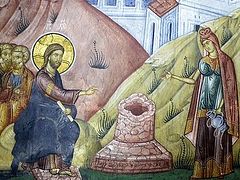Christ is Risen! We are sojourning to the end of the Paschal Season: the Feasts of the Leavetaking of Pascha and the Lord’s Glorious Ascension are coming. Last Sunday was that of the Paralytic, the man who sat at the Sheep’s Gate Pool for thirty-eight years awaiting healing from the miraculous waters of that spring. His aspirations for healing were achieved when he met Christ. Mid-Pentecost was this past Wednesday. This feast, as we mentioned on that day, lies between Pascha and Pentecost—the two great feasts. Pascha is the beginning of man’s salvation in the Resurrection, the salvation that will come to lively fruition in the eschaton, on that great and final day of Pentecost.
We heard in the Troparion of Mid-Pentecost, which we also chant today, “In the midst of the feast my soul thirsts, quench me with the waters of salvation. Thou hast said, Saviour, whoever thirsts come to me to drink.” And now we are in the Sunday of the Samaritan Woman. We heard in the Holy Gospel according to John, in the Fourth Chapter, read during the Divine Liturgy: Jesus came to a town in Samaria called Sychar, near the plot of ground Jacob had given to his son Joseph. Jacob’s well was there, and Jesus, tired as he was from the journey, sat down by the well. It was about noon. When a Samaritan woman came to draw water, Jesus said to her, “Will you give me a drink? Perhaps this is the most provocative encounter in the Holy Gospels. The God-Man thirsts and asks a Samaritan woman for a drink? The woman herself is perplexed. How, she wonders, could a Jew speak to a Samaritan woman? We hear the Lord answering her in the Gospel: If you knew the gift of God, and who it is that is saying to you, “Give me a drink”, you would have asked him, and he would have given you living water. The woman said to him, “Sir, you have no bucket, and the well is deep. Where do you get that living water? Are you greater than our ancestor Jacob, who gave us the well, and with his sons and his flocks drank from it?” Jesus said to her, “Everyone who drinks of this water will be thirsty again, but those who drink of the water that I will give them will never be thirsty. The water that I will give will become in them a spring of water gushing up to eternal life.” Whoever shall drink of the water Christ provides from His spring will never thirst again; and indeed not only this, but rivers of living water will gush forth from within his heart. There is a recurring theme now, as the Paschal period draws to a close: water. Water is the source of life. In Genesis, the Lord creates the world from the waters, from the formless void; the Spirit of the Lord moves upon the waters, and the earth and the origins of life come forth from this creational act. Let us now explore the encounter at Jacob’s Well in Samaria so we may come to true knowledge of how this meeting may benefit our salvation.
The regeneration of the soul
Our regeneration, the regeneration of the soul, occurs in the Mystery of Holy Baptism wherein we die and are raised with Christ in the triple immersion; wherein we are born again by water and the spirit, becoming a new creation. Water cleanses, sanctifies, and gives life. Yet, water itself is a created property. Whoever drinks of it will always thirst again. The water that Christ provides is: immortal life, which is preceded by healing and wholesomeness (Do you want to be made whole? was the question posed last week to the Paralytic). The Jews, God’s elect, expected a Messiah of a worldly, political and Machiavellian nature—a Messiah who would lead them to earthly glory. The Lord had loftier ambitions; the God-Man’s purpose behind the Incarnation was death’s defeat in the Resurrection and, with it, the sentencing of mankind to immortality —in the words of St. Justin of Celije. The conversation the Lord had with the Samaritan Woman at Jacob’s Well concerns this topic exactly: true Faith, which leads to immortality, to immortal life; and, the Person who grants this possibility to everyone. Who is He? How can we meet Him? From whence does He give the this immortal Water? These are all questions posed to the Lord by the Samaritan Woman. Here we must note a significant fact: Jews have no dealings with Samaritans —as the Samaritan Woman herself declared to the Lord with perplexity. The Jews had no dealings with Samaritans because the Samaritans were heretics of the worst kind—perhaps more damnable than Roman pagans. The Samaritans were simply imposters—religious frauds of the worst kind. They claimed to be descendants of Abraham, Isaac and Jacob, true worshipers of the God of Israel when, in reality, they were immigrants from Assyria—former pagans—who had adopted Judaism in a condensed form one could say; they rejected Jerusalem and the Temple and had their own Temple and functioning (false) priesthood on Mount Gezim (the Samaritan Woman will inquire of Christ on this point), and they also rejected most of the righteous ones and the prophets.
The ever memorable and righteous Elder and Archimandrite, John (Krestiankin), in a homily for this day, said—and I quote it extensively as it is a succinct definition of the conversation at Jacob’s Well—“This single meeting between Christ and the Samaritan woman turns into a meeting with the living God for both the sinful woman and for the entire world, inasmuch as here, at the well of temporal water, the hitherto unknown source of Eternal Life was first secured. Here Christ for the first time reveals Himself to be the new, inexhaustible well of living water, flowing into Life Eternal. This source cannot run dry or grow scarce, for it was not dug through human efforts, and nothing human can cloud its crystal clarity or poison its life-giving properties. This source on earth is God’s Holy Church, and its living water is the power of God’s grace, which forgives, enlightens, and sanctifies every person who comes to it.”
And yet it is here, in Samaria, that Jesus openly declares Himself to mankind as the Christ. He declares He is the answer to man’s problems, the solution to man’s eternal thirst—the new inexhaustible well of living water. He alone—through the revelation that God the Father is spirit, and those who worship Him must do so in spirit and truth—has marked out, in the heavens, the direction for man’s salvation. The word “man” in Greek, άνθρωπος, means he who looks up, he who has his sights upwards. He looks to God, has the heart on high, is not glued to materialism—to temples and to altars, or to locations—be they the Jerusalem Temple or Mount Gezim. The true worshipers of the Father are not restricted to rites and holy places; God is accessible at all times—at all times and in every place worshiped in the pure witness of our conscious—as the priest prays during the Liturgy. The Prophet Micah foretold the day when true worship would be offered to Christ in every place of His dominion: From the rising of the sun even unto the going down of the same my name shall be great among the Gentiles; and in every place incense shall be offered unto my name, and a pure offering. The true worshipers of the Father use these things—temples and icons and the rest of the material created order to assist the whole person—which is of a material substance besides being spirit—to the true worship of God. This is the revelation that the Lord manifests to the world from Jacob’s Well at Sichar in Samaria, before an adulterous and sinful Samaritan (heretical) woman.
When we are not worshipping in Spirit and Truth
We said that God is not restricted to temples. We Orthodox love to build magnificent temples dedicated to Christ, His Holy Mother, and the Saints. We go on pilgrimage and we celebrate magnificent services and rites. Might there be a contradiction between this and what Christ told the Samaritan Woman at Sichar? If engaged with correctly, in an Orthodox manner—no. If engaged with correctly, with pure spirit and truth, the Church’s liturgical life and the Holy Mysteries give life. Yet, if not engaged with correctly this true worship of the Church can morph into vanity and empty ritualistic activism. This is why we must engage in Orthodox worship prayerfully and attentively, attempting in whatever minor way to realize that our engagement in ecclesial life is a product of thousands of years of tradition, and that our worship is the voice of our Saints, of our Fathers and ancestors praying with us. These true worshipers of the Father worshiped Christ in the Spirit and Truth, which variegates the Orthodox Church. Every iota and every hymn and every arrangement of the Psalms is God-inspired, leading us to ineffable mysticism. Even the melodies and musical structures are composed in such a way that gives the soul the emphasis for the occasion. For example, for Holy Saturday they are solemn, for Pascha they are triumphant. If we are hobbyists who love to sample some fine hymnography, or if we are Curious Georges of sorts who attend church in order to meet our friends and socialize, or, worse yet, to punch a card so we can satisfy an internal, pharisaical craving for religious correctness—then we are not worshiping the Father in Spirit and Truth, and we are just tinkling (unturned) cymbal, in the words of the Holy Apostle Paul. If we clergy and chanters also have this approach to the Lord’s services and the Holy Liturgy, the people will intercept this feeling in the depths of their souls. How often do the faithful enter into the mysticism of the moment during a service, when a hymn is chanted piously and reverently from a cantor who, perhaps is not amidst the best musically talented but, who, nonetheless, chants with heart and soul? Is this not what Christ is asking for?
The first step to purification in thirst
Only when man is purified does he become a true worshiper of the Father. The first step to purification is thirst. One must thirst before being convinced that the journey to the well is necessary. One must come to an interior knowledge and conviction that the world and the contents of the world, i.e., pride, wealth, power, gluttony, lust—the main “motivators” of man’s divorce from God—are all fleeting and temporal. Since—as we will soon discover with the feast of Christ’s Ascension—man is united to God in Christ, since man via Christ’s human nature is united to the heavenly, and is already in the future Kingdom, then that is where man’s orientation lies. This is where man should direct himself, this is where man should point his compass: to the heavenly kingdom. This realization is the first pre-requisite of man’s salvation. Man must thirst and strive for the heavens, for the Kingdom of God. He must strive for the Truth, for an ecclesial relationship with Christ within the Holy Mysteries of the Orthodox Church. The Holy Sacraments are the vehicles by which the true worshipers of the Father who worship Him in spirit and truth are transported to the Heavenly Kingdom in the present, temporal age. We mention spirit and here, we mean the Third Person of the Holy Trinity: the Holy Spirit. On Pentecost we chant, the Comforter is truly God; in his sermon for this Sunday, the Sunday of the Samaritan Woman, St. Ignatius Brianchaninov infers that this day is also a pre-celebration—a prequel—to the upcoming Holy Pentecost—for the worship of the Holy Spirit, hitherto hidden to the world, is manifest. Like the Apostles on Pentecost, the Samaritan Woman—whom holy tradition names as St. Photini the Equal to the Apostles—goes forth into Sichar to preach: Come see One who has told me all I have ever done. Might He be the Christ? She evangelized to heretical Samaria, and heretical Samaria became converted to Christ. They confessed that this is indeed the Christ, the Saviour of the world. And this confession of Faith is recorded in the Holy Gospel for eternity.
We spoke of water earlier and how there is a visible connection of water between the Sunday of the Paralytic, MidPentecost, and the Sunday of the Samaritan Woman. We have been reborn when we were baptized in the name of the Holy Trinity—the Father, the Son, and the Holy Spirit in the baptismal font. We received the gift of the Holy Spirit in the Holy Chrismation that followed. Archbishop Dimitri of Kherson of Blessed Memory wrote: “Who prays to God in Spirit? He who, pronouncing the words of prayer, pronounces them not with his mouth alone, but with all his soul and heart”. I sincerely pray we become, by an encounter with the Living Christ, true worshipers of the Father—not with many words, but with actions. With actions: spiritual actions, movements, prayers, almsgiving, mercy; spiritual actions of the soul and heart. Spiritual actions that gush forth from the heart as rivers of living water whose source is Christ. Spiritual actions that serve as a witness to the eternal Christ, to His Truth, to His Kingdom, so that the world may believe on Him. Christ is Risen! Indeed He is Risen!




